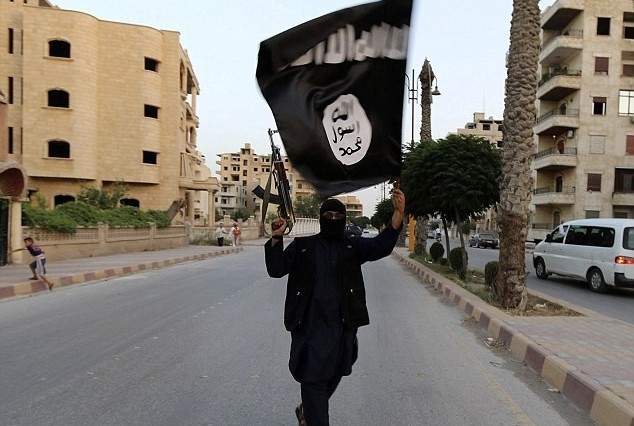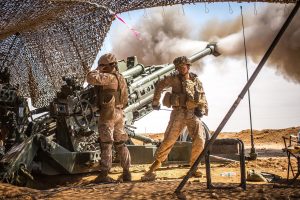by Wayne White
American political and media commentary on ISIS (which calls itself the Islamic State) since the beheading of James Foley has been flush with exaggeration and skewed focus. Identifying Foley’s murderer is desirable but far less important than tackling ISIS proper and its leadership. Unfortunately, many ISIS cadres have done far worse off camera. The voice narrating the video of Foley’s execution was British, and he was probably chosen by ISIS leader Abu Bakr al-Baghdadi simply to produce maximum shock effect in the West.
Most importantly, ISIS faces numerous challenges in holding onto what it has now, particularly in Iraq, where further expansion will likely be marginal. There are also ISIS vulnerabilities to be exploited by a new Iraqi government with much broader appeal. ISIS clearly poses a threat to the US (and other countries), but that threat needs to be soberly assessed.
Dialing Down the Hysteria
The beheading of Foley, a dreadful and tragic event, sparked a surge of gloom, doom, and hype among senior US officials and within the media at large. Of late, estimates of total ISIS fighters and foreign recruits have soared, but are based on what could only be iffy information. This is precisely what ISIS’s leaders intended.
ISIS perceives, as do other ruthless entities, that the US (and its allies) are traumatized far more by the death of one citizen than vastly broader atrocities in the Middle East. Hurt by US airstrikes (and fearing more) ISIS hoped to frighten Americans enough to make Washington back off. In that sense, the execution boomeranged: US and Western leaders are more alarmed, but determined to ramp up, not relax, measures against the radical Sunni group.
ISIS is dangerous, but its nature and the threat it represents must be defined accurately. A bizarre characterization of ISIS was made by Joint Chiefs Chairman General Martin Dempsey last week when he said ISIS has an “apocalyptic, end of days strategic vision.” This concept relates more closely to the Biblical New Testament Book of Revelation, reflecting mostly Christian, not Islamic, thinking. In fact, ISIS’s strategic vision, in historical terms, is rather pedestrian, albeit infused with barbarism: a quest to establish its version of a state, reinforce its power, defend or expand its present conquests, and lash out at its enemies.
Territorially, ISIS is weaker than suggested by the lurid maps showcased regularly by the media. Over 90% of the land under ISIS control is the driest, most underpopulated, and poorest in the greater Fertile Crescent region. In that respect, some of its holdings in Iraq are its most valuable assets, including large intact cities along rivers.
Vulnerabilities
The militant al-Nusra Front (less abusive than ISIS, and clashing with it in Syria) is well aware of ISIS’s vulnerability to foreign military action. It is no coincidence that al-Nusra released American hostage Peter Theo Curtis only days after Foley’s murder. Al-Nusra evidently is afraid of a harsh US response against ISIS, and hopes to keep out of the line of fire.
Despite the extent of its success, ISIS does not have a very large army of dedicated fighters. Its fanaticism and its use of shock, awe, and terror have been force multipliers. However, spread thin along the edges of its sprawling realm, it recognizes increased American aerial attacks in support of better-equipped Kurdish and revitalized Iraqi Army units could threaten areas far beyond just the Mosul Dam.
The heavy weapons ISIS secured while seizing Mosul and has since used to its advantage are largely irreplaceable, and continuing US air attacks would erode that edge quite a lot. At some point, ISIS could be reduced to fighting much as it did before—as light infantry.
Furthermore, having generated a more intense foreign and Iraqi domestic reaction, if faced with stiffer opposition simultaneously in both Syria and Iraq, ISIS would have to juggle its limited forces among various threatened sectors (always dicey). ISIS has also been fighting behind its own lines against surrounded Iraqi garrisons in one city, a major dam, Iraq’s largest refinery, several towns, and some areas dominated by hostile Sunni Arab tribes.
Many non-extremist ISIS Iraqi allies are potentially unreliable. However, ISIS does not have enough core combatants to fully occupy its vast holdings, so it depends heavily upon these allies.
As with its al-Qaeda in Iraq (AQI) predecessor, the restrictions and abuses committed by ISIS will eventually alienate many localities, secular Sunni Arab factions, and tribes. To keep tribes, Ba’athists, and former insurgents who do not share its fanatical vision loyal, ISIS might have to spread around some of its money.
Yet, in the face of airstrikes and warnings of worse from the Jordanians, Saudis and others close to former Sunni Arab Iraqi military officers and certain tribes, these fellow travelers could get very nervous about their future with ISIS. And with their prior nemesis in Baghdad, Nouri al-Maliki, gone, cutting a deal with a new government while decent terms can still be achieved could begin to look very inviting.
A New and Improved Iraqi Government?
To encourage the desertion of ISIS’s allies, prime minister-designate Haider al-Abadi must put together a new government tailored to—despite Baghdad’s political snake pit—reduce the Sunni Arab grievances upon which ISIS thrives. Grand Ayatollah Ali al-Sistani, a source of emulation for nearly all Iraqi Shi’a, knows this.
He appealed at prayers on Aug. 22 for a government made up of leaders who care about Iraq’s “future and its citizens,” regardless of their ethnic and religious affiliations, in a “realistic” fashion. Sistani’s pressure on Iraq’s dominant Shi’a majority politicians already made the difference in ousting Maliki. Hopefully, Sistani will keep the heat on until such a government is formed.
If many of ISIS’s allies are not wooed away, even a considerably revitalized Iraqi Army and Peshmerga supported by airstrikes might make only slow, costly progress against ISIS forces. In cities like Mosul, Fallujah, Ramadi, and others, ISIS could be near impossible to oust short of inflicting severe damage on these large urban areas. This is what happened across Syria in fighting between the regime and various rebels.
In 2004, from my perch in the US Intelligence Community, I warned of the destruction that would result from an American assault on insurgent-dominated Fallujah. Sure enough, despite the employment of crack US forces on the ground and far more careful use of firepower than by the Assad regime in Syria, the US operation heavily damaged the majority of the city. Some of the residual bitterness over that carnage still fuels militancy there—ISIS’s first unchallengeable conquest in Iraq.
Overseas Threat
Ironically, the danger of ISIS attacks radiating outward from its Syrian-Iraqi base would become more significant if ISIS suffered major reverses in the field. If the self-declared “Caliphate” was in retreat and its area of control shrinking, recruits flush with rage and possessing foreign passports would be more likely to leave intent on revenge.
There is, however, a more proximate threat. With numerous individuals inspired by ISIS’s twisted attitudes probably still at home, terrorist attacks could occur even if Western passport holders fighting with ISIS never return. Some of these domestic “sleepers” could attack soft targets at any time in response to calls from ISIS leader Abu Bakr al-Baghdadi—or as individuals.
So is ISIS a direct threat to the US? Yes. However, the same can be said of a number of al-Qaeda-affiliated groups. Instead of obsessing over that definition or chasing down one killer, all concerned must focus on how that overarching threat could manifest itself both domestically and regionally.





Akbar, I’m an American so George Washington is considered the father of my country. Any quote you could supply by him about the State of Israel would be as believable as ones in which the source is Ilan Pappe. He is no more a scholar than is David Irving.
I have no interest in debating the Arab-Israeli conflict here. I (accurately) quoted the HAMAS Covenant in order to disprove the author’s contention that there is not an end of days tradition in Islam. The part I quoted is a well known Hadith. It is also true that Osama bin Laden adopted some of the Shia tradition about the Mahdi and adapted that to his propaganda.
Should you continue to fail to respond to my points that the Hadith is accurate and well known and that bin Laden did adapt some ideas about the Mahdi then I will be forced to conclude you agree. This blog entry is about ISIS and what makes them tick. I believe General Dempsey was correct. What do you think?
It seems the questions I raised about your identity and whereabouts have remained unanswered!
My question was what is your real full name? Are you living in Washington DC, Paris, or Tel Aviv? How many years you served in the covert and military enterprise of Israel seeking annihilation of Gazans?
I am delighted you love America. I love the seven billions living in the world. For me, nationality does not establish morality. A barbarian may be an American, a German, an Israeli, an Iranian, or a Hungarian. The same is applicable to a being who is compassionate, enlightened, learned, accomplished, humane, kind, nice, polite, and refined.
Contrasting historian Ilan Pappe and David Irving is appropriate. Your implication is they do not meet your standards of human decency. One has to read a few books to realize why your friends in Tel Aviv persistently have endeavored to muzzle both men because they detest Israeli atrocities. American publishers came under pressure not to print US editions of their books.
Concerning ISIS, I again suggest checking the facts, for example, “ISIS Domestic Terror Threat Created by CIA and U.S. Military” at the following Link.
Certainly, the vast majority of American citizens are moral people. Yet, our governments for years have defied the aspirations of Americans whose intention is to live in harmony with the rest of the world.
As to ISIS and Israel, please read a little. ISIS Leader, Abu Bakr Al Baghdadi, was taught by Israeli Mossad, NSA Documents Reveal.
Why not ask your friends in Tel Aviv to offer their “facts.”
Akbar claims: “ISIS Leader, Abu Bakr Al Baghdadi, was taught by Israeli Mossad, NSA Documents Reveal.”
I searched wikileaks and I didn’t see any such document. You can reference all the conspiracy nut job web sites you like but if you can’t point to the document on wikileaks I’m calling bull excrement.
I’m also pointing out that you failed to meet my challenge. I’ll take that to mean you agree that the author is wrong about General Dempsey.
As far as revealing my actual name that won’t happen. Sites such as these attract unstable nut jobs. They spew all sorts of crazy conspiracy theories. Some of them might even be dangerous. Discretion is the better part of valor.